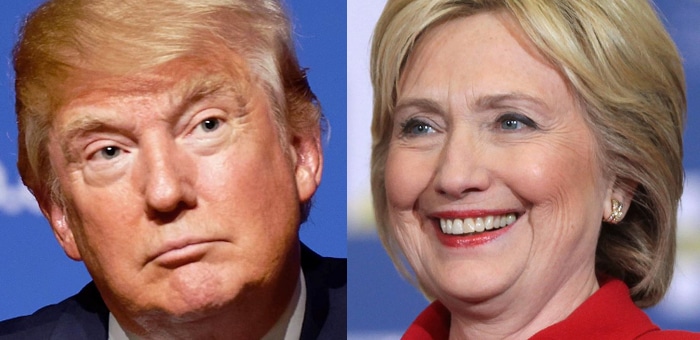
Photo credit Gage Skidmore
For the last several months, Hillary Clinton and Donald Trump have argued with each other through the media and in several TV debates on a number of issues but they have not made specific commitments to the entertainment industry or the 300,000+ businesses that directly benefit from the creative economy, worth $40 billion every year.
Both candidate's websites make no mention of the entertainment sector and voters are ill-informed on how a Clinton or Trump presidency will make changes, improvements or even shake things up in the media business, however, there have been some hints as to what could happen based on their comments regarding trade, the economy and the recent news about the AT&T merger with Time Warner.
Donald Trump's position
Recently, Donald Trump made it clear that he would oppose the AT&T merger with Time Warner and has often called the media "rigged" against him, however, he has not put forward proposals on how he would implement new laws to support entertainment companies or ensure that media conglomerates don't undermine competition for other companies, which is a major concern.
He has indicated that he wants to toughen America's stance on China, renegotiate trade deals and thinks the Trans-Pacific Partnership Trade agreement with Asia is the "rape of our country." This could indicate a reset of America's trade policy, and could jeopardize existing deals for the entertainment industry abroad, especially if tariffs are implemented.
Trump has made it clear that it won't be business as usual and he will take steps to protect American workers and bring jobs back but in doing so, Hollywood and the broader entertainment industry might find that they can't export to other markets like China, where films are making more than 60% of all their box office revenues abroad.
In retrospect, Trump has stated that he will cut taxes on businesses from 35% to 15% which would create more jobs and allow businesses to invest more in growth at home. The downside to this could be that state budgets and tax incentives are reduced as there would be less tax revenue to pay for these programs.
Hillary Clinton's position
Hillary Clinton has not stated whether she opposes or supports the AT&T and Time Warner merger, but suggested it would be scrutinized. This puts her at odds with a majority of Americans that are against the merger outright,
Clinton has made a pledge to help small businesses with litigation and wants to make financing more available to support growth. She has also made a commitment to cutting red-tape and wants to offer federal incentives to help new businesses get off the ground, however, she is not providing a tax cut and wants corporations to pay their fair share. This could be seen as less favorable for larger businesses in entertainment, but would not necessarily mean a tax increase.
Originally a strong supporter of TPP, Clinton now opposes it and wants to bring in a Trade Prosecutor to enforce international deals, however it is not clear how this would affect negotiations between the entertainment industry and export countries that could in turn place quotas if restrictions were introduced,
One of her flagship policies will be to strengthen women's rights and equal pay, another major issue for the entertainment industry that has so far struggled to create an inclusive workforce, A Clinton presidency could pave the way for new legislation to make sure companies are hiring women and not discriminating on pay. This would have a broad impact on the entertainment business and would be seen as a positive development, however it is unclear what steps she would take to do this or if there is a plan to make this happen.
Clinton has in the past put forward proposals as early as in 1999 where she called for a uniform ratings system across the entertainment industry to protect children from violent content and better inform parents. This was opposed but she continued to push forward with new legislation in the Senate including the FEPA bill in 2005 (Family Entertainment Protect Act) to protect children against violent sexual and graphic content in video games which was never enacted.
We can speculate that a Clinton presidency could lead to tighter regulation on content to protect younger viewers given her past track record in the Senate, where she supported 5 bills covering the impact of media on children and enjoyed support from Republicans and Democrats on a number of issues.
In conclusion
Both Clinton and Trump have economic policies that could help or hinder the entertainment business but so far, we don't have any indication of what they plan to do that specifically addresses the industry, content creation, film or TV. On a positive note, Trump's tax cut would have a favorable impact on the entertainment business at home and so would Clinton's federal support and financing commitment for small businesses.
Until the candidates make any specific pledges to the 1.9 million workers in the film and TV industries, we can't say for certain what kind of changes we would see, only that there is still time for Clinton and Trump to put forward their proposals before November 8.





















